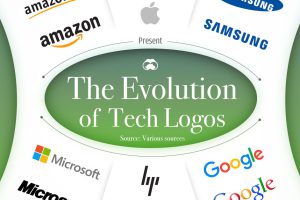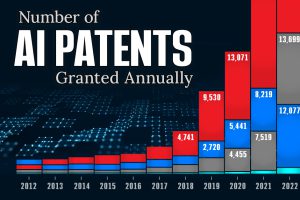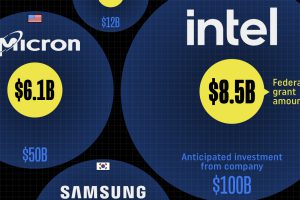
Chart: The AI-mazing Patent Race
The Chart of the Week is a weekly Visual Capitalist feature on Fridays.
Artificial Intelligence is transforming the way we live, and the tech giants are racing to stay ahead of the curve.
AI-related funding totaled an estimated $15.2 billion in 2017, a 144% increase over the previous year. The U.S. tech industry leads with a 50% share of those investments, even with China swiftly closing the gap in terms of patents and AI research.
AI itself isn’t new, but boosted computing power, increased connectivity, and the sheer volume of data has paved the way for the fourth industrial revolution of AI.
“The coming era will be looked back upon as the ‘AI era,’ when AI became the defining competitive advantage for corporations, government agencies, and investment professionals,” predicts David Nadler, founder of Kensho Technologies.
The Potential of AI
Artificial Intelligence is less about sentience and more about accelerated learning.
AI technology looks for patterns, learns from experience, and predicts responses based on historical data. An AI-powered computer can’t produce a unique thought, but it can probably predict yours. The end result: AI is able to learn new things at such a speed that it can predict your behavior and preempt your requests.
From the advancements in natural language processing that make Siri and Alexa possible, to the machine learning advancements that give robo-advisors their trading chops, AI’s ability to simulate human thinking means it can also streamline our lives. It can preempt our needs and requests, making products and services more user friendly as machines learn our needs and figure out how to serve us better.
This makes AI a vital source of competitive advantage.
AI’s Competitive Advantage
In their quest to stay on top of the Silicon Valley food chain, familiar tech and retail giants are dipping their toes in AI to execute diverse strategies:
Amazon
Amazon leverages AI technology to analyze and predict your shopping patterns. Alexa is very Artificially Intelligent indeed, and the revolutionary Amazon Go model continues to push the boundaries of AI tech on the ground.
Google
Google uses machine learning and pattern recognition in its search and facial recognition services, as well as natural language processing for real-time language translation. The company has also released a series of smart home products, like the Nest thermostat. After acquiring more than 50 AI startups in 2015-16, this seems like only the beginning for Google’s AI upgrade.
Microsoft
Microsoft’s Cortana is powered by machine learning, allowing the virtual assistant to build insight and expertise over time. In 2016, the tech giant added Research and AI as their fourth silo alongside Office, Windows, and Cloud, with the stated goal of making broad-spectrum AI application more accessible and everyday machines more intelligent.
Apple
Apple is notoriously tight-lipped about their AI research, but it’s safe to say Siri is only the tip of the iceberg. The tech giant received a patent this year for augmented-reality glasses, slated for a release in 2020.
Facebook
Facebook uses artificial intelligence to suggest photo tags, populate your newsfeed, and detect bots and fake users. The social media giant has also come under fire for their widespread use of AI analytics to target users for marketing and messaging purposes.
These tech kings are driving the research that will increasingly intertwine our lives with artificial intelligence, and it’s that investment that just might secure their future.





